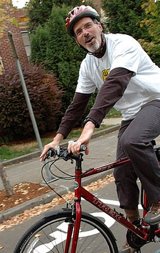
at a Walk and Bike to School
event in 2006.
(Photo © J. Maus)
Two of the state’s top health officials are calling for Oregonians to get out of their cars — not just to save the planet, but to save themselves.
Oregon’s top doc, State Epidemiologist Mel Kohn, and Lillian Shirley, director of the Multnomah County Health Department, were both mentioned in an Oregonian article today about their efforts to make public health a larger part of the climate change dialogue.
Kohn told Oregonian reporter Don Colburn that, “If we get people out of their cars, not only do we reduce pollution, but we also get them walking.”
Colburn also wrote that,
“Persuading people to walk or bicycle instead of driving is what Lillian Shirley, director of the Multnomah County Health Department, calls a ‘three-fer.’
It improves personal health by helping people control their body weight. It improves community health by reducing traffic, noise and dirty air. And it improves global health by reducing greenhouse gases that pollute the air and trap the Earth’s heat in the atmosphere.”
Kohn is a member of the Governor’s Climate Change Integration Group. That group issued a report in March that encouraged the state to invest more money in biking infrastructure as a key way to reduce greenhouse gases and Vehicle Miles Traveled (VMT).



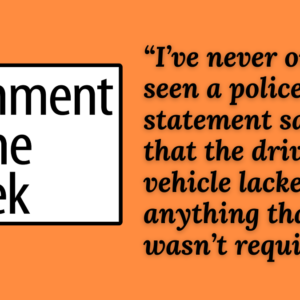
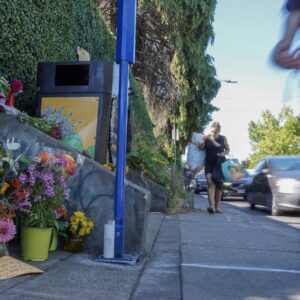
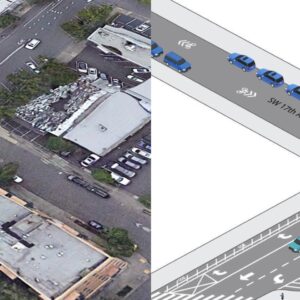
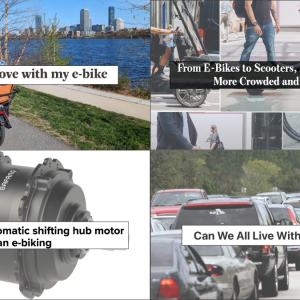
Thanks for reading.
BikePortland has served this community with independent community journalism since 2005. We rely on subscriptions from readers like you to survive. Your financial support is vital in keeping this valuable resource alive and well.
Please subscribe today to strengthen and expand our work.
Nice to say that stuff, but public policy has to give concrete support to private choices, otherwise very few people have those constructive choices as an option.
It\’s not a matter of persuasion. If these folks think it is, then they\’re ignorant of the reality of cycling in America.
The data clearly show that people *want* to bike, but they\’re afraid to because of the deadly recklessness and negligence of some drivers.
If they want people to bike more, all they have to do is make the streets safer by educating motorists and enforcing the laws they routinely break with respect to cyclists.
Safety for vulnerable roadway users is the threshold issue standing in the way of more liveable communities.
It\’s amazing that the politicians in office can\’t put the problems we all face on the table and connect the dots. Global warming, obesity, oil & resource wars, congestion, healthy lifestyle & communities, seditary lifestyle problems can be partially solved with the simple & functional bicycle. They talk ethanol, biodiesel, hybrids, all costing millions when a bicycle can solve so much and have a small impact on the enviroment & our wallet. When will corporations stop controlling the direction of the country and the peoples needs & desires be considered first.
Thanks Mel & Lillian for suggesting solutions that our right inside our garages.
I\’ve never quite understood why politicians don\’t put the global warming debate alongside a number of other issues. Given that global warming is a serious issue there is still a fair amount of contention whether this is man-made global warming or simply part of a natural cycle. So many other issues are tied in with cars and our energy needs, why not use these as well to get people out of their cars?
Cars do not simply emit carbon, but also many other toxic chemicals, both inside and out of the car.
\”\”new car smell\” is the result of the steering wheel, dashboard, armrests, and seats (among other parts) off-gassing nasty things like chlorine, bromine, lead, mercury and other chemicals and toxins that are not good for breathing and not good for human health.\” (http://tinyurl.com/5c3go4)
The oil runoff into our water tables is horrific (especially from two-stroke motors – lawn mowers, Vespas, leaf-blowers, etc . . .). Used oil is a toxic material, albeit recyclable in some cases. Mercury is used in a number of car parts, by a number of manufacturers, and all this mercury is not always recycled or disposed of properly for end-of-life cars. I\’ve always wondered too about how much small-grain material is being dispersed into the atmosphere, water, and soil through the erosion of the roads and tires (which might not be as toxic as some chemicals, but it is still creating a nasty environment in our water). Also what is the effect of us dumping highly heated gas into the air? Car exhaust out of the catalytic converter is around 300 – 500F, that heat has to go somewhere and our planet only dissipates so much heat into space at a certain rate. Of course obesity is a major issue of our car-culture. So we need to get more politicians, as said above, to connect the dots and talk about ALL these issues and more, rather than just hammering an issue that isn’t getting everyone onboard.
By the way, the whole ethanol solution is ridiculous. Some countries are tearing down forests simply to produce more ethanol, yet in doing so their releasing massive amount of carbon into the atmosphere at the same time that they’re eradicating forests capable of mitigating carbon emissions. See this article in Time: http://tinyurl.com/2w84uj
Sorry for the long tirade . . .
Russell, you forgot to mention that leaking gasoline storage tanks are also responsible for a substantial amount of groundwater contamination in this country and elsewhere.
Simply \”calling for Oregonians to get out of their cars\” is a simplistic, feel-good thing any politician can do to make them look \”green.\”
The hard part is creating law and policy that allows people to feel safe on the road without getting in a steel cage.
These folks are well-intentioned, but they need to be educated about what it\’s really like riding a bike amidst Oregon drivers.
They can come and do my commute home with me. I\’ll take the short route – keep it to 20 miles. That would open their eyes!
BURR – Excellent point, but added to that is the spills of oil as their shipped across the sea. The exposure of refinery workers to the constant fumes, despite safety precautions. And the environmental damage of simply getting the crude in the first place.
DJ Hurricane – Yep, this is always the hard part. We\’ve got a great idea, but how the hell do we implement it? People will continue to complain about spending on bike/pedestrian facilities so long as they want to drive; they\’ll drive until they feel it is safe and convenient enough to bike/walk.
I think that enforcement and education are one, important step among many, but one that is easier to implement than massive infrastructure changes. I really wish that we could get a number of these politicians and officials (the mayor, the Chief of Police, etc . . .) out riding bikes for a few weeks as their primary means of transport and see whether they start seeing some of the issues as more important. I really am a big fan of retesting drivers every few years and placing harsher penalties on peoples\’ driving privileges (this is one thing that people need to understand as well, driving is a privilege NOT a right) when they have \’accidents.\’
A State that backs biking is great!
Thank You,
Joe
Se should fire the DOT\’s and replace them with these guys then.
does anyone know the amount of CO2 and toxics created by the production, shipping and marketing of the average steel or aluminum bicycle? before we get too high on our horses, it might be worth knowing the talk such that we can walk the walk (errr…ride the walk?)…
Hickeymad- I don\’t have specifics, but yes, if you\’re buying a foreign made bicycle there will be a fair bit of emissions in the process and even with a locally made bike the company is most likely buying steel/aluminum/etc. fabricated in a foreign country BUT there are a few points:
1) Cars are also primarily fabricated in foreign countries, all the supplies are shipped here, and then they are assembled. This includes (to my knowledge ) most of \’domestic\’ car parts.
2) In the room that you can fit one car for shipping you can fit many, many more bicycles (I can\’t even guess on the number, but both weight and cubic volume come into play with this).
3) Once a bicycle has arrived in the United States, yearly maintenance and operation of it as a vehicle is minuscule in terms of CO2 emissions and waste compared to that of a car. For example: Your average American drives roughly 12k miles a year. This will involve, for proper maintenance, on average 4 full oil changes, and (if you say the average car is, oh, 20 mpg, which is probably high) 600 gallons of gas.
When people tell me that bikes are not emission free, I tell them they are correct. We, as humans, will never live an emission free life. We, however, can do things to greatly reduce our carbon (and other pollutant) footprint. Riding a bike is drastic reduction NOT complete elimination. I do think that having specific numbers would be fantastic though.
Naked human beings aren\’t emission-free — we fart and belch, after all — but I\’m not going to get all guilt-tripped about it.
When you stack up all the human and planetary effects of the manufacture and useage of a car against those of a bike, the bike will win. For me, that makes the choice pretty simple, even if the reality is not.
The amount of emissions from making a bike is miniscule in relation to the amount in making an automobile. Furthermore, the emissions actually become positive when the trips that would be made with a car are offset by being made by bike!
I worked for Mel Kohn for about three years. And he DOES bike to work quite often, as does many of his staff (and I did too a couple days a week, which was back before I was actually doing it almost all the time as I am now…)
Mel Kohn is a great guy. I mean fantastic.
He could be somewhere making gobs and gobs of money – but instead he earns comparatively what amounts to a pittance as a public servant for YOU AND I.
He and his staff, the Oregon Office of Disease Prevention and Epidemiology (under the Oregon Department of Public Health) are some of the most driven, socially conscious, ethical, and motivated people I have ever met. Almost every one of them is qualified to be making more money in the private health related sector – but instead they do some hard work helping prevent outbreaks and make health better for all of us. Indeed, public health departments have a much higher rate of return and net benefit to society than any other type of health care, as it is better to prevent health issues than to deal with them after they occur.
They are great people. But they are NOT in transportation. They are looking at this from the eyes of HEALTH professionals. Obeisity and Air-Toxics are huge public health problems.
But these folks are FAR FAR more than \”well intentioned\”. They make very real impacts each and every day they come to work, from Mel Kohn on down.
Additionally, their office is also responsible for bicycle helmet safety programs, providing helmets for people and educating them how to use them correctly.
They ARE out there on the Oregon roads cycling, and they DO know the risks. But they are doctors and epidemiologists and informaticists. However, having their data and their guidance certainly helps the Transportation officials make better decisions.
What we need to be doing is getting the Transportation officials to *listen* to the Mel Kohns of the world.
Now to a side topic:
And Russel: Ethanol and Biodiesel are *good* things ONLY IF DONE RIGHT. Just because something *can* be done wrong doesn\’t mean it HAS to be that way. Cellulosic ethanol from waste products makes sense. Biodiesel from Algae or other high yield sources or waste products makes sense. Don\’t throw out the baby with the bath water. Make sure that politicians know that if we want to use \”green\” technologies that they need to be actually \”GREEN\”! No imported palm-oil biodiesel. No corn based ethanol…. We need them to write the laws so that we CAN\’T buy improperly made biofuels. But this paragraph has little to do with this story, so I\’ll leave it at that. But remember – good intentions are nothing without good methodology to back them up…
John – I didn\’t intend to come across completely anti-Ethanol or Biodiesel. I know that both can be done in wonderful ways and have great potential. Unfortunately, corn based ethanol is really what a lot of people are getting right now and a lot of damage is being done to produce it in some areas. I agree with you on all counts, so we\’ll just leave it at that, but I just wanted to clarify I am not anti-Ethanol, I\’m just anti-doing-it-wrong.
Would there be any value for the cycling culture if we were able to quantify these emissions/impacts?
I find these sorts of discussions exasperating due to the lack of factual information available regarding quantification of environmental benefits. The discussions always boil down to unsupported statements that are easily contradicted by other equally unsupported statements.
Perjaps i am just too much pf a geek, but it seems to me that the cycling industry/culture os passing up a good opportunity to take a leadership role in this sort of discussion. For instance, how exactly does a bicycle stack up to other modes of transport in terms of greenhouse gas emissions? Exactly how many trips by bike does it take to offset carbon emissions from a bikes production?
is there any possibility or opportunity for generating offsets by choosing cycle travel over auto travel? Would these offsets have a monetary value worth pursuing? How could these be quantified?
Why the heck NOT ask these sorts of questions?